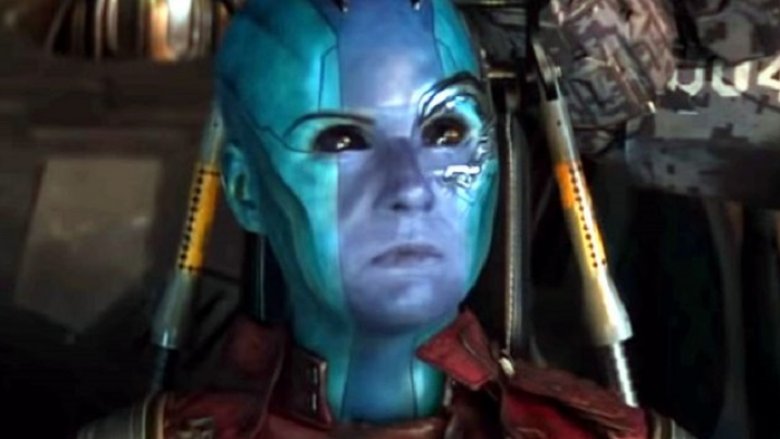Endgame Writers Explain Why A Major Death Couldn't Be Reversed
Even the power of all six Infinity Stones combined has its limits.
So declared Avengers: Endgame screenwriters Christopher Markus and Stephen McFeely in a recent sitdown with the New York Times, addressing the film's wrenching death of one of the MCU's longest-tenured characters. In case you haven't already guessed, we're venturing into major spoiler territory here, so if you haven't seen the film, now would be a good time to vamoose.
The MCU's most prolific scribes sat down with the Times to answer a whole host of nagging questions about Endgame, but in fielding the most poignant question posed to them, they offered a ton of insight on one of the film's most indelibly emotional moments. On a quest to recover the Soul Stone from Vormir during a jaunt to the past before it was acquired by Thanos, Clint Barton (Jeremy Renner) and Natasha Romanoff (Scarlett Johansson) find themselves faced with the same conundrum the Mad Titan dealt with in Avengers: Infinity War: in order to possess the stone, you must lose that which you love. In a wonderful and heartbreaking illustration of the pair's bond, they end up actually fighting each other, each determined to be the one to go over the cliff to their deaths so that the other may complete the mission. In the end, the Black Widow prevails — so to speak — and plunges to her doom on the planet's rocky beach, leaving a distraught Hawkeye wailing to the heavens with the glowing yellow stone in hand. The question asked of Markus and McFeely in regard to this moment was simple: Why did Natasha Romanoff have to die? After all, Bruce Banner was able to use the power of the Tony Stark-assembled Infinity Gauntlet version 2.0 to bring back all of the heroes who perished in Infinity War's Decimation — why could he not bring her back, as well?
Before giving up the answer, the pair gave a little insight into their thought process in dealing with the death of a founding Avenger — and the group's only woman. "Her journey, in our minds, had come to an end if she could get the Avengers back. She comes from such an abusive, terrible, mind-control background, so when she gets to Vormir and she has a chance to get the family back, that's a thing she would trade for," said McFeely. "The toughest thing for us was, we were always worried that people weren't going to have time to be sad enough. The stakes are still out there and they haven't solved the problem. But we lost a big character — a female character — how do we honor it?"
Markus then chimed in: "Tony [Stark] gets a funeral. Natasha doesn't. That's partly because Tony's this massive public figure and she's been a cipher the whole time. It wasn't necessarily honest to the character to give her a funeral," he said, before getting to the heart of the issue. "The biggest question about it is what Thor raises there on the dock. 'We have the Infinity Stones. Why don't we just bring her back?'"
The answer lies in the very nature of the Soul Stone, and the trade that it demands. "But that's the everlasting exchange," McFeely said. "You bring her back, you lose the stone."
Apparently, if Banner had concentrated with single-minded focus on resurrecting Romanoff, he may have sealed the fate of literally everyone else by giving up the Soul Stone, negating the noble sacrifice she had made. Of course, her fate may have been Barton's — if not for the impassioned plea of one of Endgame's crew. Asked if there were a possible outcome in which Arrow Guy made the ultimate sacrifice, McFeely said, "There was, for sure. Jen Underdahl, our visual effects producer, read an outline or draft where Hawkeye goes over. And she [said], 'Don't you take this away from her.' I actually get emotional thinking about it."
Markus agreed. "And it was true, [Hawkeye going over instead would have been] him taking the hit for her. It was melodramatic to have him die and not get his family back. And it is only right and proper that she's done."
Well, "done" might not exactly be accurate. Sure, in the MCU's timeline, Earth's Mightiest Heroes will be Black Widow-less going forward. But that won't stop Mighty Marvel from looking into the past: after being promised for years, Black Widow is finally getting her own solo vehicle, which is currently in production and will focus on the future Avenger's early years and recruitment by S.H.I.E.L.D. The film's official synopsis reveals that the flick will take place "15 years after the fall of the Soviet Union," which would put it right around 2006 — several years before the Iron Man armor was even a gleam in Tony Stark's eye. Johansson will reprise her role, and the flick also boasts the red-hot Florence Pugh (Fighting With My Family), David Harbour (Stranger Things), and Rachel Weisz (Disobedience) among its cast. Aussie director Cate Shortland is set to helm the picture from a scipt by Jac Schaeffer, who contributed to the screenplay for Captain Marvel and will showrun the Vision/Scarlet Witch WandaVision limited series for Disney+.
So, while the only true family she's ever known may have seen the last of Romanoff (sniff), we the viewing audience have not. Black Widow is expected to be the first film of the MCU's Phase 4 (with July's Spider-Man: Far From Home rounding out Phase 3), which raises another intriguing question: how will its events figure into whatever grand, overarching narrative Marvel Studios has planned next? We can't wait to find out, and to see Johansson suit up as our favorite Russian superspy at least one more time.
